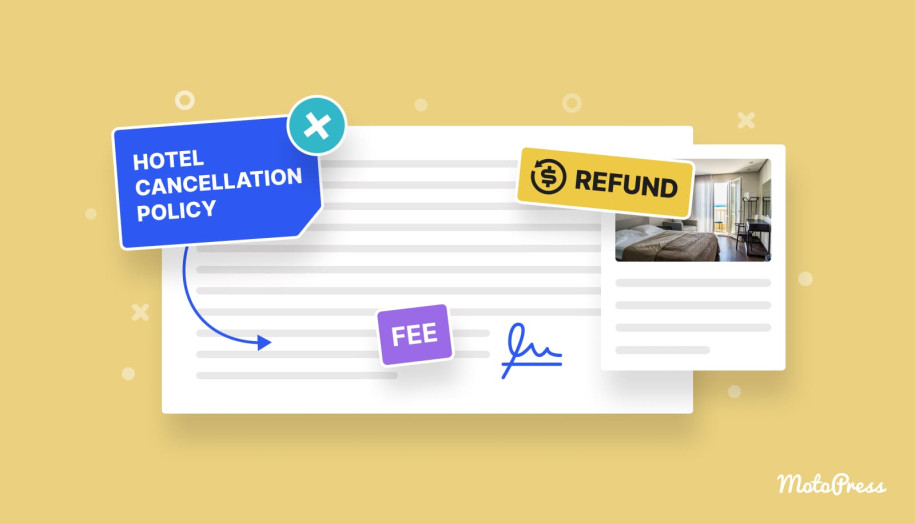Creating a Hotel Cancellation Policy: What Guests Want to Know
Table of Contents
What’s the best way to apply a hotel cancellation policy? Can I help with handling cancellations? If you’re looking for an answer to any of these questions, we are happy to help.
Needless to say that cancellations are an integral part of hospitality, and without a policy in place, they can lead to lost revenue and missed business opportunities. In today’s post, we’ll take a close look at the purpose of the hotel reservation cancellation policy, its core parts, and how it can help you to protect your hotel and make sure that your guests are satisfied.
What is a Hotel Cancellation Policy?
 Before diving deeper into the details of creating a cancellation policy for hotels, let’s explore what it is.
Before diving deeper into the details of creating a cancellation policy for hotels, let’s explore what it is.
A hotel free cancellation policy is a combination of terms that define how and when guests can cancel or modify their reservations. Besides, it also determines whether they are eligible for a refund or need to pay a hotel cancellation fee in certain cases. Such a policy secures your hotel from scammers and provides a clear communication tool for guests. Here are some benefits that a well-prepared cancellation policy offers:
- Operational efficiency: By having predictable bookings due to a hotel cancellation policy, your hotel team can manage core processes more effectively.
- Guest clarity: With clear policies in place, you can provide more understanding to your guests regarding interaction as well as reduce complaints. Overall, using such policies helps enhance the overall guest experience.
- Flexibility control: By tailoring cancellation terms by season, room type, or rate plan, you achieve better flexibility in terms of managing your hotel’s reservations. This also plays a core part in controlling your booking strategy.
- Competitive advantage: By having a transparent policy, you can make your hotel more appealing to travelers who value flexibility.
Needless to say, the hotel cancellation policy plays a vital role in hotel operations. Besides, it influences your hospitality business’s financial stability and positive guest feedback. Without it, you risk unexpected revenue losses as well as getting no-shows or last-minute cancellations. In today’s competitive market of accommodation services, travelers often compare booking terms before making decisions. This means a fair and well-communicated cancellation policy can often become a deciding factor that gives your hotel an advantage.
Cancellation Policy’s Key Components
 To better understand how you can implement a policy for hotel cancellations, let’s look at the key components it should include.
To better understand how you can implement a policy for hotel cancellations, let’s look at the key components it should include.
Multiple parts define the terms and conditions of hotel cancellation. Usually, they include the requirements for guests to cancel or modify their reservations. These components help protect the hotel’s interests. However, they also provide support for guests and keep them informed. As a result, you get various elements of a policy combined into full protection for your hotel’s reservations. Here are the main elements you may want to consider:
- Cancellation window;
- Refund policy;
- Fees and penalties;
- No-show terms;
- Modification policy;
- Non-refundable rates.
These are just some of the hotel cancellation policy elements. We’ll take a closer look at them below. Don’t forget that including these elements in a written policy helps ensure consistency and provides guests with a better understanding of what to expect in case of cancellation of their online reservations. Now let’s see how these elements help you craft a reliable hotel cancellation policy.
1. Cancellation Window
 First of all, define the cancellation deadline. This defines how far in advance your guests need to cancel to avoid penalties. Usually, cancellation windows range from 24 to 72 hours before check-in. In this case, hotels have enough time to potentially reschedule the reservation. Besides, it also provides them with flexibility to adjust their plans without losing any funds. As a result, guests don’t lose any money if the cancellation deadline is met, and hotel managers don’t face any risks.
First of all, define the cancellation deadline. This defines how far in advance your guests need to cancel to avoid penalties. Usually, cancellation windows range from 24 to 72 hours before check-in. In this case, hotels have enough time to potentially reschedule the reservation. Besides, it also provides them with flexibility to adjust their plans without losing any funds. As a result, guests don’t lose any money if the cancellation deadline is met, and hotel managers don’t face any risks.
2. Refund Policy
 Refunds are also a vital part of the hotel cancellation policy. It explains whether guests are eligible for full, partial, or no refunds based on their cancellation terms. Moreover, this part of the hotel free cancellation policy explains how refunds are processed. Thus, with a clear approach to refunds, you can prevent misunderstandings and deliver financial transparency. Additionally, refunds help with the following:
Refunds are also a vital part of the hotel cancellation policy. It explains whether guests are eligible for full, partial, or no refunds based on their cancellation terms. Moreover, this part of the hotel free cancellation policy explains how refunds are processed. Thus, with a clear approach to refunds, you can prevent misunderstandings and deliver financial transparency. Additionally, refunds help with the following:
- Building trust and credibility;
- Encouraging more direct bookings;
- Enhancing guest flow;
- Reducing negative reviews.
3. Fees and Penalties
 In this next section, we’d like to talk about specifying cancellation charges applied for cancellations that go outside these deadlines. For example, such fees include:
In this next section, we’d like to talk about specifying cancellation charges applied for cancellations that go outside these deadlines. For example, such fees include:
- a flat fee;
- a one-night charge;
- a cost of the entire stay;
- peak season penalties (only during high seasons).
With a properly written hotel cancellation fee policy, you can make cancellations powerful enough to protect your hotel from any revenue losses, especially if we’re talking about last-minute changes or empty rooms.
4. No-Show Terms
 No hotel wants to deal with no-shows. That’s why your hotel cancellation policy also needs to include no-show terms. They define what happens when a guest doesn’t cancel their reservation and fails to arrive. In most cases, hotels charge the full price of the first night. Depending on the booking type, even the whole stay can be charged if the guest doesn’t arrive. With such precaution measures, this part of the hotel reservation cancellation policy ensures the hotel isn’t left with unoccupied rooms.
No hotel wants to deal with no-shows. That’s why your hotel cancellation policy also needs to include no-show terms. They define what happens when a guest doesn’t cancel their reservation and fails to arrive. In most cases, hotels charge the full price of the first night. Depending on the booking type, even the whole stay can be charged if the guest doesn’t arrive. With such precaution measures, this part of the hotel reservation cancellation policy ensures the hotel isn’t left with unoccupied rooms.
5. Modification Policy
 This part of the cancellation policy defines how guests can change their booking details. This may include dates, number of guests, or room types as part of the reservation. It also allows changes within a set cancellation window. This means you can treat late modifications similarly to cancellations. For both guests and front desk staff members, it offers flexibility while maintaining proper structure for key hotel operations, even when you manage it using a hotel website. Moreover, with a well-written and thought-out modification policy, you can:
This part of the cancellation policy defines how guests can change their booking details. This may include dates, number of guests, or room types as part of the reservation. It also allows changes within a set cancellation window. This means you can treat late modifications similarly to cancellations. For both guests and front desk staff members, it offers flexibility while maintaining proper structure for key hotel operations, even when you manage it using a hotel website. Moreover, with a well-written and thought-out modification policy, you can:
- Enhancing guest flexibility;
- Reduces cancellations;
- Improving hotel booking confidence;
- Strengthening guest relationships;
- Streamlining operations.
6. Non-Refundable Rates
 Finally, we’d like to mention non-refundable rates as part of the hotel cancellation policy. They concern discounted bookings that cannot be canceled without refunding the full payment. These rates are designed for attracting budget-conscious guests. However, they also guarantee revenue for your hotel. When using such rates and including them in your hotel cancellation options, bear in mind that guests must be informed about the no-refund conditions of such reservations.
Finally, we’d like to mention non-refundable rates as part of the hotel cancellation policy. They concern discounted bookings that cannot be canceled without refunding the full payment. These rates are designed for attracting budget-conscious guests. However, they also guarantee revenue for your hotel. When using such rates and including them in your hotel cancellation options, bear in mind that guests must be informed about the no-refund conditions of such reservations.
Examples of Implementing the Hotel Cancellation Policy Options
As you see, a hotel reservation cancellation policy needs to include quite a handful of elements to stay both detailed and clear to your guests. But how do popular hotels display such policies? Let’s look at some examples.
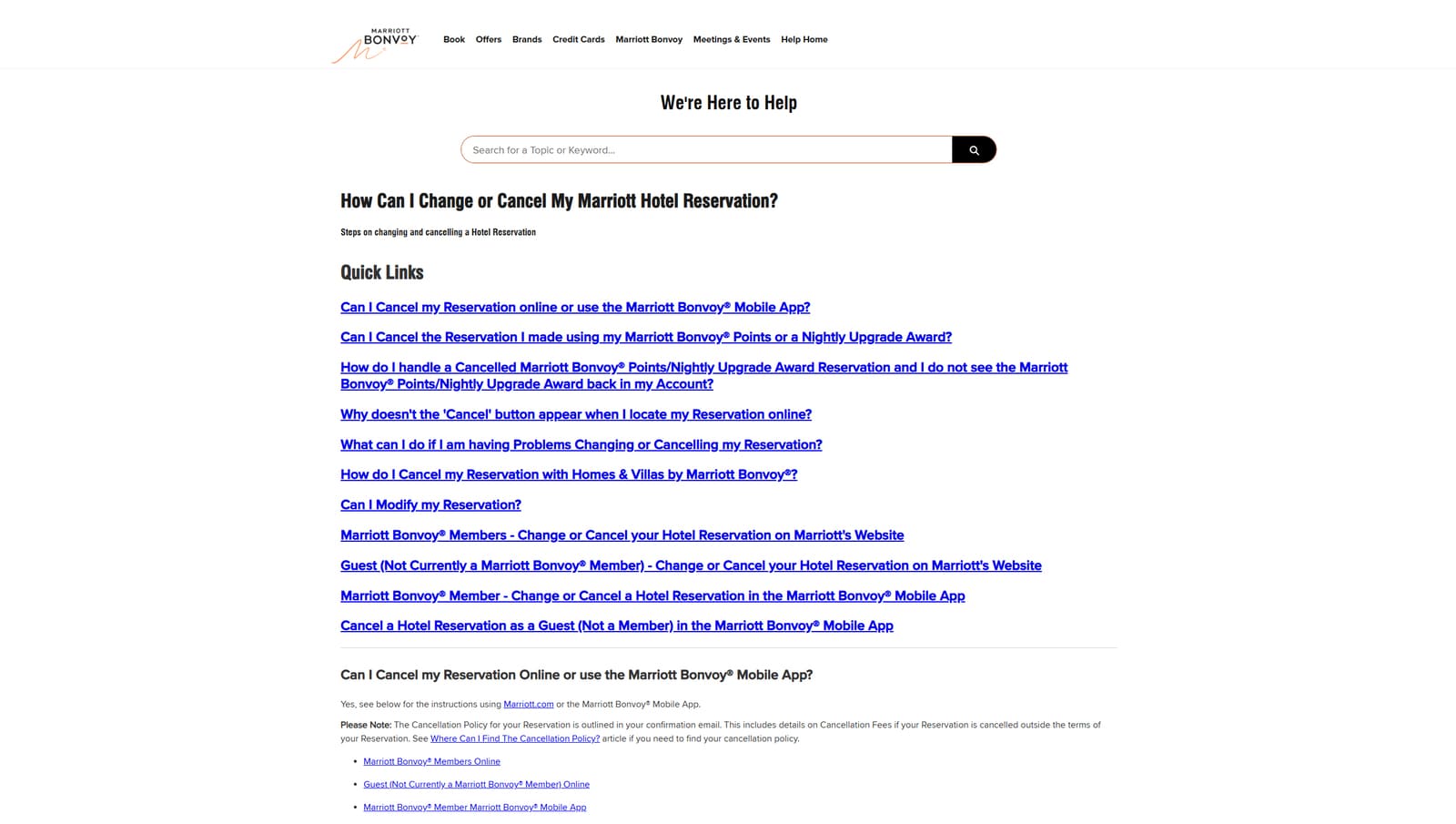 In most cases, hotels simply prepare an FAQ page that provides detailed information about cancellations and how they are handled. This is true for the Marriott-Bonvoy hotel chain that provides an extensive list of questions and answers regarding reservations, how they can be modified, and cancelled.
In most cases, hotels simply prepare an FAQ page that provides detailed information about cancellations and how they are handled. This is true for the Marriott-Bonvoy hotel chain that provides an extensive list of questions and answers regarding reservations, how they can be modified, and cancelled.
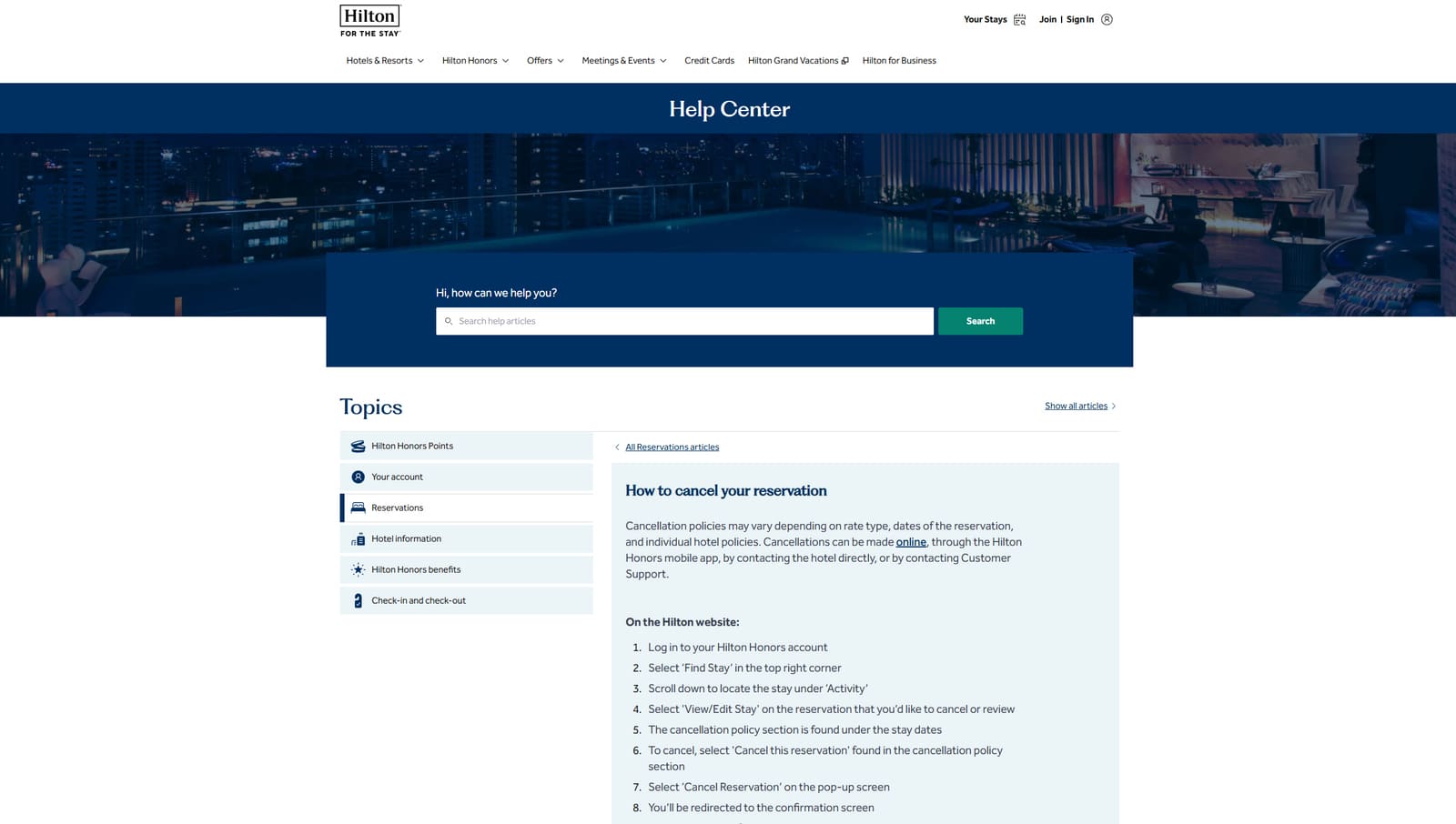 Other hotel chains like Hilton create whole knowledge centers that offer a similar informative experience. However, instead of providing a single page like Marriott does, Hilton offers multiple support articles written in an easy-to-understand manner. Different articles answer different questions, such as the refund policy or cancellation handling.
Other hotel chains like Hilton create whole knowledge centers that offer a similar informative experience. However, instead of providing a single page like Marriott does, Hilton offers multiple support articles written in an easy-to-understand manner. Different articles answer different questions, such as the refund policy or cancellation handling.
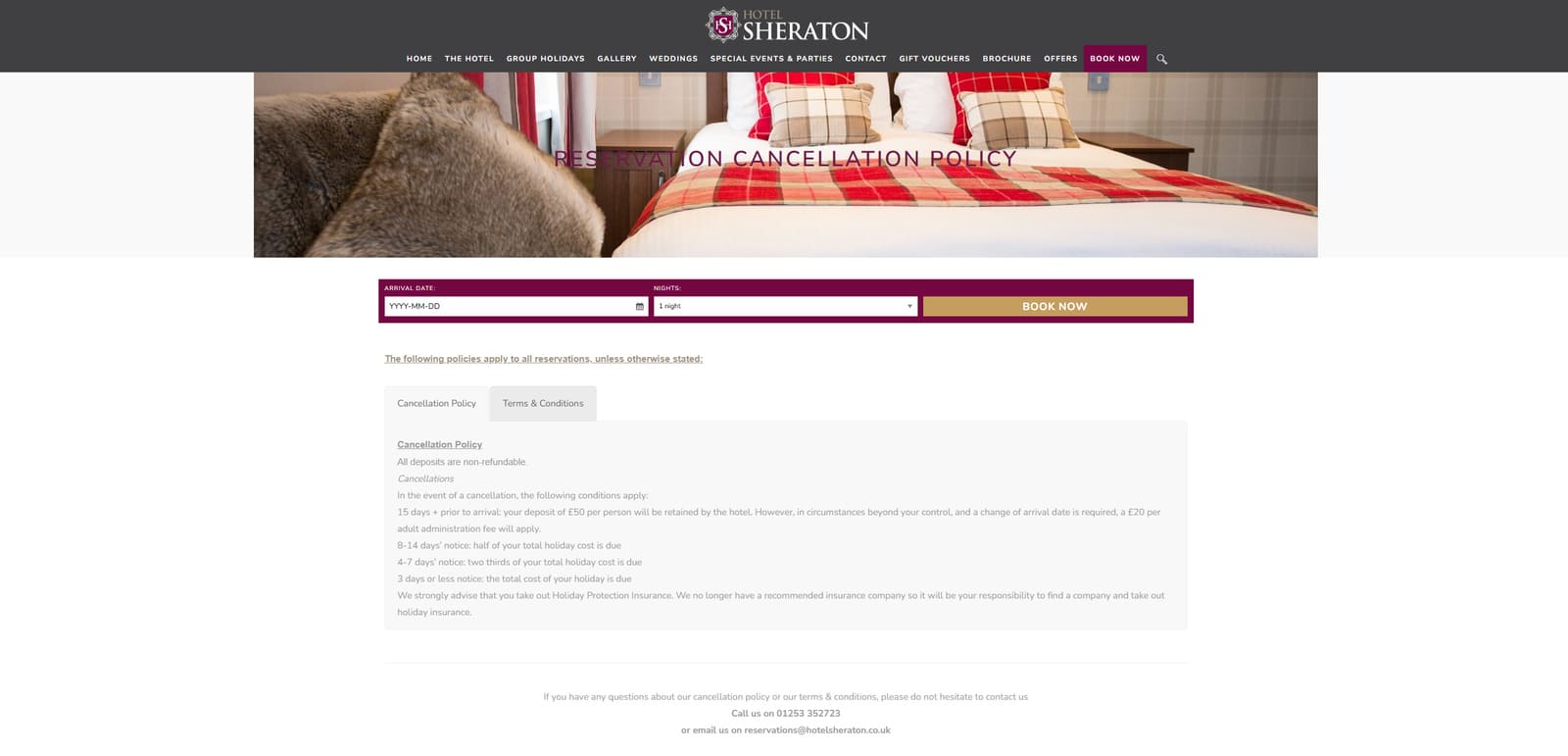 One of the classic approaches to hotel cancellation policy display is used by Sheraton. This hotel simply provides a more summarized set of cancellation rules. However, it also provides a detailed explanation of terms like check-in time and lost property retrieval period. It is located on a separate tab of the same page and also includes other necessary information about reservations and various hotel regulations.
One of the classic approaches to hotel cancellation policy display is used by Sheraton. This hotel simply provides a more summarized set of cancellation rules. However, it also provides a detailed explanation of terms like check-in time and lost property retrieval period. It is located on a separate tab of the same page and also includes other necessary information about reservations and various hotel regulations.
What are the Proper Ways to Handle Hotel Cancellations?
 With a better understanding of the hotel cancellation policy and how it works, let’s explore the ways of catering to cancellations. To put it simply, it requires a combination of professionalism, empathy, and, of course, meeting the policy terms. For example, when a guest requests a booking cancellation, you must respond promptly and clearly state the applicable terms of your policy. Moreover, if the guest is within the free cancellation window, you’ll need to accept the refund request or cancellation efficiently. If no free cancellation is possible, explain the charges in a respectful tone, offering alternatives if possible. The alternatives may include:
With a better understanding of the hotel cancellation policy and how it works, let’s explore the ways of catering to cancellations. To put it simply, it requires a combination of professionalism, empathy, and, of course, meeting the policy terms. For example, when a guest requests a booking cancellation, you must respond promptly and clearly state the applicable terms of your policy. Moreover, if the guest is within the free cancellation window, you’ll need to accept the refund request or cancellation efficiently. If no free cancellation is possible, explain the charges in a respectful tone, offering alternatives if possible. The alternatives may include:
- Rescheduling or date changes without additional fees;
- Providing partial refunds or a reduced hotel cancellation fee;
- Transferring the reservation to another person;
- Issuing a voucher valid for a future stay;
- Offering upgrades or added perks on future bookings.
Note that keeping communication transparent and customer-oriented also helps a lot when cancelling a reservation is necessary. It not only reinforces your credibility but also helps maintain positive guest relations.
Booking System with Cancellation Tools
If you own a hotel and want to automate cancellation processes and save time on other hotel management activities, we recommend using special software developed for that purpose. One of the affordable and feature-rich examples that can help, especially if you have a WordPress website, is MotoPress Hotel Booking. It comes with easy-to-use booking management tools and allows you to create your own rules for canceling reservations. Hotel guests and administrators can easily cancel bookings in just a few clicks using this plugin. Besides, you’ll get an automatically updated accommodation availability calendar that will keep you from having to track everything manually. The plugin also comes with other notable features:
- Multiple bookable properties;
- Support for compulsory taxes and fees;
- Built-in channel manager;
- Payment gateway integrations;
- Multiple premium add-ons.
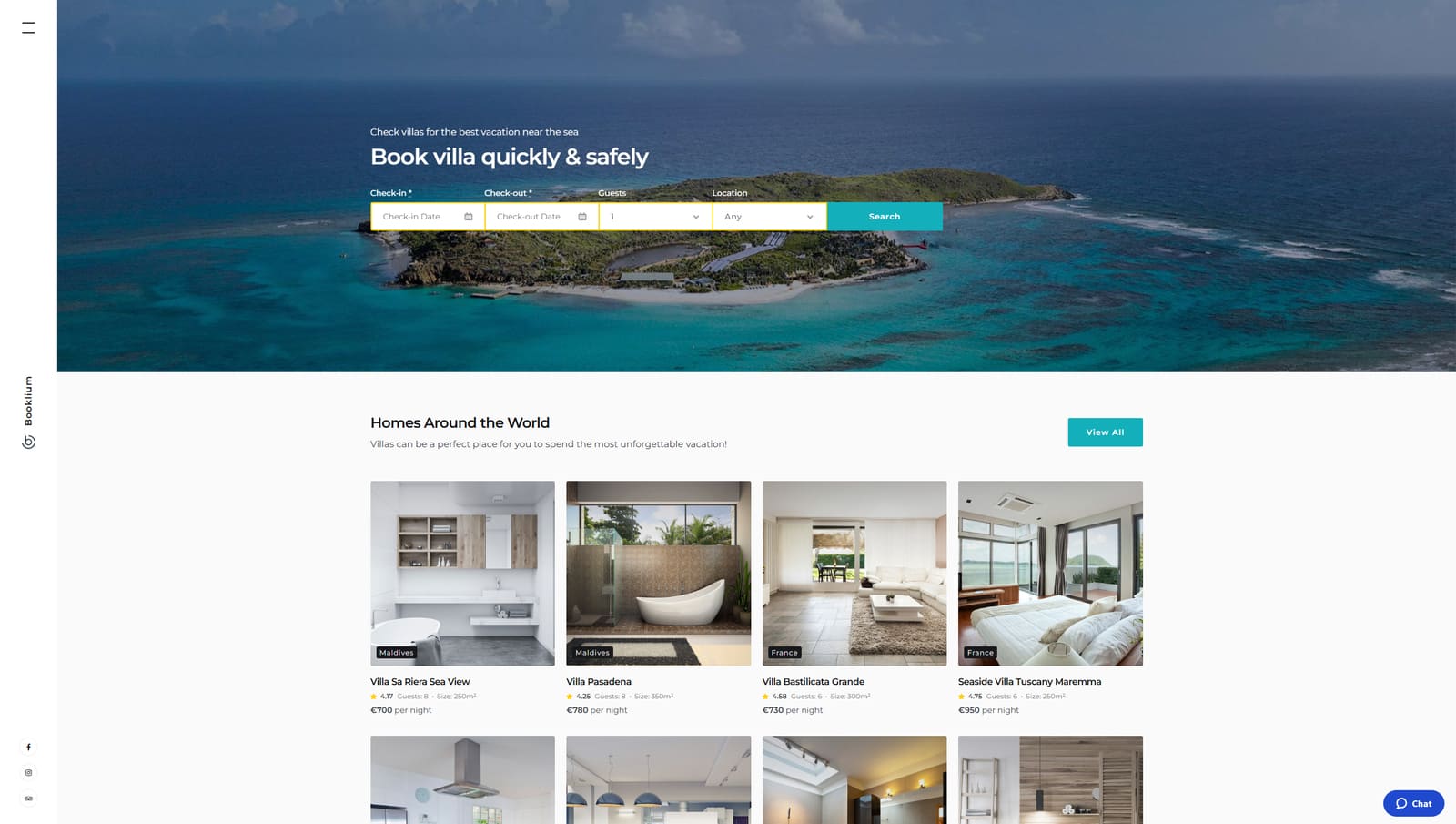 In case you need to automate your cancellations and get an attractive website design, we suggest taking a look at Booklium, a theme by Motopress with an integrated Hotel Booking plugin. Offering multiple layouts and homepage designs with an integrated accommodation search system, this solution helps to build a noticeable and customizable online presence for your hotel. With it, you can present all your accommodation options effectively, while also setting dynamic room rates and easily confirming or canceling bookings with a few clicks. In addition to the features mentioned above, you also get access to dozens of pre-designed pages and the Hotel Booking mobile app to let you manage your hotel on the go.
In case you need to automate your cancellations and get an attractive website design, we suggest taking a look at Booklium, a theme by Motopress with an integrated Hotel Booking plugin. Offering multiple layouts and homepage designs with an integrated accommodation search system, this solution helps to build a noticeable and customizable online presence for your hotel. With it, you can present all your accommodation options effectively, while also setting dynamic room rates and easily confirming or canceling bookings with a few clicks. In addition to the features mentioned above, you also get access to dozens of pre-designed pages and the Hotel Booking mobile app to let you manage your hotel on the go.
Key features:
- 5+ homepage designs for hotels and vacation rentals;
- Built-in booking system with accommodation search;
- Optimized for Gutenberg;
- 34+ Getwid blocks for customization;
- 6 layouts for property pages and blog.
| Name | Developer | Price | Installations |
|---|---|---|---|
| Booklium | MotoPress | From $89/year | 2,3k+ |
Conclusion
 We hope this overview of the hotel cancellation policy terms and details helped you understand its necessity and how it improves the guests’ experience. With a well-crafted policy for such cases, you can safely protect your hotel from no-shows while also ensuring that your clients receive the top-notch accommodation they chose your hotel for. Moreover, easy hotel free cancellation can give other benefits to your hotel after it’s implemented:
We hope this overview of the hotel cancellation policy terms and details helped you understand its necessity and how it improves the guests’ experience. With a well-crafted policy for such cases, you can safely protect your hotel from no-shows while also ensuring that your clients receive the top-notch accommodation they chose your hotel for. Moreover, easy hotel free cancellation can give other benefits to your hotel after it’s implemented:
- Higher customer loyalty: Guests are more likely to return or recommend the hotel, knowing it values their needs.
- Improved brand image: A guest-first approach positions the hotel as trustworthy, accommodating, and professional.
- More bookings: Free cancellation policies attract more bookings, especially on OTAs where filters prioritize flexible stays.
- Stronger online presence: Good reviews and booking flexibility can improve rankings on travel sites and search engines.
- Positive reviews: Guests appreciate flexibility and are more likely to leave favorable feedback, even if they cancel.
